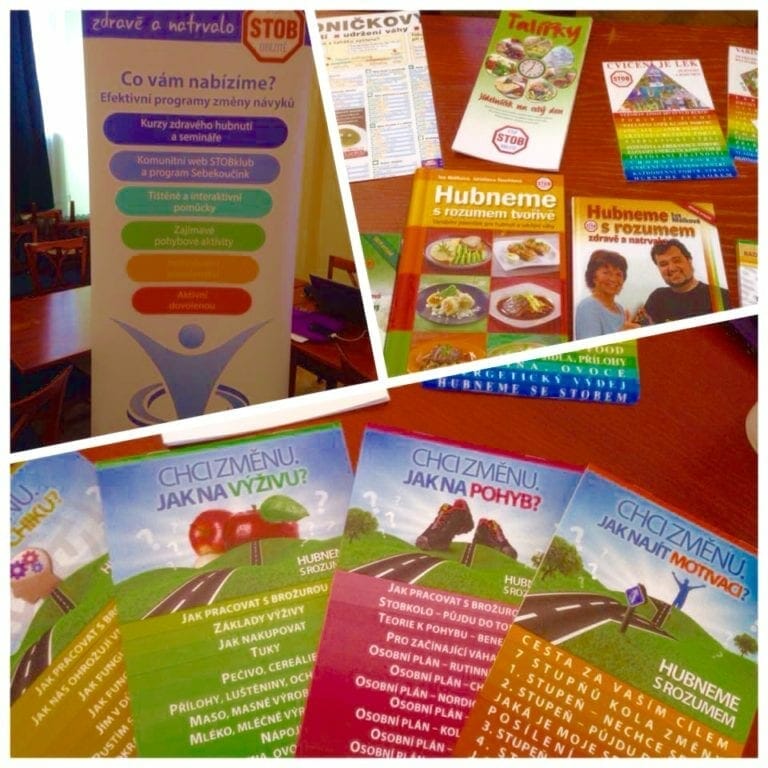Alexandra, tell us a bit about the organisation you represent in the Czech Republic.
I represent patients of the Czech Republic via the organization STOBklub which is a patient organization of and for people with weight management challenges and those who strive to live healthier lives. STOBklub is a patients´ platform of the original STOB, Stop Obesity organization. We offer a community webpage with various tools for weight management, like listings of nutrients for individual meal planning, recepies, activity counters, and also psychological and coaching advice in a friendly community of like-minded people. Through this organisation, our users can find advice, help, support and also friendship and help from other members. We can assist them with practical and expert advice.

I understand that you have developed an interesting series of workshops recently which are of interest to both individual patients and health care practitioners. Can you tell us about this?
Of course. For some time, we have offered workshops, talks and presentations for our members, for specialists and for the general public too. We conduct two types of workshops: a shorter, evening event with one or two presenters who speak about a very specific topic. Recently, for example, we had a presentation on how to manage stress without eating more – where we talked about other ways of dealing with stress, relaxation techniques were demonstrated and audience members had a chance to experience these tools first hand. I discussed how planning, through daily plans, meals, organising consistent exercise times – can minimize stress in everyday life. We also offer one and day two day workshops which include expert presentations.
In February, there were two very interesting meetings. The first one focused on how to chose food products – what to buy, how to read labels, what to look for on labels, which foods are healthier than others. The second workshop covered the theme of the inevitable weight-loss plateau and what to do when it occurs: changing patterns, changing foods or ways of preparing food, taking a “holiday“ for a week – even if it´s only in your mind and you just stop controlling everything for couple of days. I know that one of the important EU projects EASO is involved in is researching tools for weight-loss maintenance and it will be interesting to follow this research and feed it into our work.
For March, there are very interesting topics planned as well. First, we will hold a workshop for specialitsts, nutritional advisors and therapists on how to work with their clients. We will cover how to speak with new clients, how to help them to make their first changes, how to understand their degree of motivation and readiness for change, and how to work with people through the weight plateau and in their everyday lives. The second workshop is open to the public and the theme is how to prepare a suitable meal plan: what it should consist of, the types and amount of macronutrients should be in the daily diet and how to develop a meal plan for weight-loss and for weight maintenance – and healthy living.
These represent just a few examples of programs we have developed for the winter.
Do you have any upcoming conferences you’d like to share with us?
Yes, indeed. On April 24, we will open a conference Dialogue for Health II. This is the second conference of this type, the first one having taken place last October. And the topics where identified by our members and include discussion of palm oil, beer, aspartame and other artificial sweetners, detoxification, and nutrigenomics. We will have some highly respected experts and specialists discussing these topics, including a biologist, biotechnologist, nutritional therapist, chemist, and medical doctors. The conference is meant to be a meeting place for discussion by specialists and is open to the public as well.
I understand that in addition to focusing on food and healthy nutrition, your organisation is very interested in physical activity and weight loss maintenance. Please tell us more about this.
Physical activity is a very important part of healthy living, not only of weight loss or maintenance. As a dancer and a personal fitness trainer, I believe we should all be physically active – according to the ability and health of each individual. Exercising, even if only in the form of regular slow walks, helps tremendously in every aspect of your life. And people who are active physically are more active in their life as whole; this is my experience.
We offer not only tools for weight loss but tools for living a healthy life. We teach people how to eat, what and when, we´d like them to move, to relax, to sleep, simply put to enjoy life and be healthy. For the average overweight person it is not that hard to lose weight per se; it´s far more difficult to maintain that weight loss and to remain healthy. And that is our main goal – to help people become healthy. If they want to lose weight, good for them and we help with this too. But not with some drastic diets or drastic caloric restrictions.
We work with a cognitive behavioral therapy approach, which means that we teach people how to behave differently and live more healthily this way. That´s why we offer them materials and tools for stress management, for exercising, for learning healthy thought patterns, how to see their body, how to learn to love their body no matter the size so they can move toward health. They can use our blogs with advice or various fun competitions and plans with individual ‘tasks of the week’ (drinking more water, sleeping 8 hours each night, working up to walking 10,000 steps a day…expert articles on our webpages www.stobklub.cz, provide materials ready for participants including: booklets, books, e-magazine Pochutnej si se STOBem (http://www.stob.cz/cs/casopis-pochutnej-si-se-stobem).
Recently we prepared new materials for health practitioners as well which can help them identify the degree of motivation their patients have to lose weight and live healthier lives – and those materials can help them find out in which particular ways their patients need help the most, whether that means help with an exercise regime, healthy eating, more relaxation and so on. Practitioners can then offer their patients a booklet addressing the most appropriate topic and those patients can begin to work on these issues. In our community we provide help them according to individual needs.
As we all prepare for European obesity day on May 21, 2016 can you tell us about your strategy and plans?
This year, we have a very special project ready. As we want people to be active and are interested in inspiring them to move and exercise, we made new counters for our web page. This new application (app) counts steps (walked or run), kilometres travelled via bicycle (stationary or outdoor) and minutes of active exercising daily. We want our users to compete with themselves and try to improve every day. And we are really interested in finding out how many kilometres could be walked, run, and cycled by our members through May 21 – that is in a three-month period which more or less corresponds with our longest program of change – 12 weeks. We´ll keep you all updated with the results!
